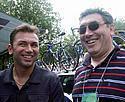
Recently on Cyclingnews.com |
A quick chat with Johan Bruyneel
US Postal's directeur sportif is widely regarded as the sport's canniest manager. As the Vuelta looms, Cyclingnews' editor Jeff Jones caught up with Johan Bruyneel to find out if the US Postal team plans to dominate Spain's Grand Tour the way it did France's.
 |
Cyclingnews: After winning the Tour, and all that it entails, how hard is it to refocus for another three week stage race?
Johan Bruyneel: It's not so hard, since we have planned the Vuelta as one of our main objectives since the beginning of the year already.
And we have a team that's going into the Vuelta to try to win it. The Vuelta in September is a race that you have to be very motivated for, and that's what we are: very motivated.
CN: Have you decided the US Postal riders for the Vuelta yet, and what will be their individual roles?
JB: Heras, Rubiera: objective general classification. Pena, Vandevelde, Kjaergaard, Zabriskie, Cruz, Barry and White: assist our two protected riders.
CN: Will you treat it as similar to the Tour, with one or two leaders, and no-one (except the leaders) to go for stage wins?
JB: Yes, that's what we want to try. The general classification is our main goal.
CN: Without a Lance Armstrong in your team, but with several other good climbers, how good do you think your chances are for the overall?
JB: I think they're quite good. Heras and Rubiera are in good shape, and the rest of the Postal team is fresh and well prepared. The only difference with the Tour is that there are more favourites, and more teams who will take their responsibilities.
CN: Further to this, how important are the time trials to your team compared to the mountain stages?
JB: As I said in the tour, one cannot win the Vuelta, and especially this year's Vuelta, in the time trials. A big stage race is won in the mountains, with attacks or just being consistent uphill. One can loose a big tour in the TTs though, a climber cannot lose too much time against the clock.
CN: Again, it seems as though ONCE will be your biggest rivals, given their depth. You finished third in the 1995 Vuelta (won by Jalabert), riding for ONCE. Will this help you gain any kind of advantage over them on their home ground?
JB: Maybe. But on the other hand, all the riders from '95 on ONCE have changed. But maybe the strategy hasn't...
CN: Do you think Joseba Beloki has improved enough since last year to win?
JB: I think Beloki can win the Vuelta for sure, it depends how well he has recovered from his efforts and also from the mental stress from the Tour.
CN: How about the others, for example Oscar Sevilla and Santiago Botero? Do you think they will threaten more in the Vuelta than in the Tour?
JB: Sevilla definitely. He has to prove himself after his withdrawal in the Tour. I think that Sevilla is more of a Vuelta rider than a Tour rider, he's one of the big favourites, together with Simoni, Beloki, Casero, Mercado, Heras, etc...
CN: Is the Vuelta, with its shorter more intense stages, more nerve-racking for you than the Tour?
JB: No, for me the tour is more nervous. The Vuelta uses generally bigger roads, which makes it easier.
CN: Do you like what the organisers have done with the race in this regard?
JB: I think it's a lot better to have shorter stages at the end of the season. The result is for sure the same, and long stages would be boring for everybody.
CN: What about Unipublic's more radical plan of having two pelotons in the first week? Are you in favour of this, or do you think it will detract from its 'Grand Tour status'?
JB: I'm not in favour of that idea. A big tour has to stay a big tour. That includes that the all the riders and teams have to compete against each other during three weeks, on the flats, in the time trials, in the mountains.
With the new plan, as I understand it, that wouldn't be the case. I think it would also be very complicated to explain to the spectators.
